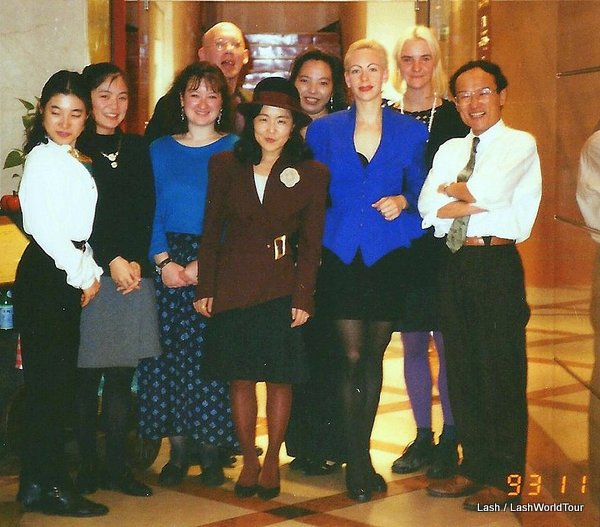How to Learn English Survey
Recently I was contacted by Kaplan English schools about a very interesting survey they conducted on How to Learn English. In the survey, they asked hundreds of people their opinions on the best ways to learn English and whether any media like movies, TV, music, computer games or comics had helped them learn the language.
Kaplan collected the results of their survey, compiled them into a colorful and fun ‘infographic’, and then asked people to further comment on the results of the survey. This is where I came in…
Because I had taught English in Japan for six years, they wondered what my opinions were on the topic, if my students had used media to help them learn the language, and what other tips or advice I could give on the best ways to learn English.
My English teaching experience
To put things in perspective, let me start with a brief background on my teaching experiences. I taught in private English language schools in Kyoto and Osaka, where all of my students were adults. They ranged in age from high school students to senior company executives and included college students, office workers, company managers and house wives.
All of them were there by their own choice, paid fairly high tuition, and had some concrete reasons to learn the language. Some used English at work. Others loved traveling overseas. Some were preparing for university courses or future careers. Others just enjoyed meeting and talking with westerners. For whatever reasons, they were all genuinely interested in learning and therefore self-motivated.
Many of them used the English they learned with me out in the real world quite regularly, be it at work, while traveling, or socializing.
Because of their genuine interest, motivation, and especially because they applied their lessons in real life, students’ English noticeably improved over time. So my schools were pretty successful at helping people learn English.
I also taught children part time at two other small private English schools. For the most part, those kids were also quite eager to learn English, applied themselves in class, and improved their English skills dramatically, including pronunciation, vocabulary and conversation abilities.
With my teaching experiences in mind, let’s take a look at the Kaplan survey
(find my feedback below the survey)
Let’s start with the survey’s primary question:
“What in your opinion is the best way to learn English?”…
I certainly agree with the majority vote that the very best way to learn English is to travel to an English-speaking country and take classes there. I’ll add a few other pointers:
* Immerse yourself in speaking English every day in daily life and as much as possible
* Try to avoid using your own language. Stick to English as much as possible
* Make local friends and hang out with them as much as possible, instead of hanging with people who speak your own language.
* Stay as long as you can in an English-speaking country. The longer you stay the more in-depth your English language skills will become, the more natural your intonation and pronunciation, and the longer you’ll retain the language even after you leave.
My personal language learning experiences:
I can vouch for the effectiveness of these suggestions based my own experiences learning Asian languages. I speak conversational level Japanese, Thai, Malaysian and Bahasa Indonesia.
First I learned Japanese. Before moving to Japan, I took weekly Japanese lessons at a community college for 6 months. I practiced on my own on a daily basis. By the time I moved to Japan, I could introduce myself, ask a lot of questions, count, ask prices and so on. BUT, my pronunciation was wayyyy off and my listening skills zilch. Although I could ask questions, I could rarely understand people’s answers. My vocabulary, even basic vocabulary, was also quite minimal.
But my Japanese improved very quickly after I arrived in Japan and started speaking to people every day in Japanese. My language improvement and learning rate increased dramatically when I started living in the country and using the language on a daily basis.
I had nearly the same experience with Thai. Before starting my world travels I bought myself a Thai cassette and book language course. For 4-5 months I diligently learned to read, write, speak and listen to basic Thai. Having the tapes was crucial for listening and pronunciation skills, especially since Thai is a tonal language.
When I finally arrived in Thailand, once again I could introduce myself, ask basic questions, count and ask prices, and so on. But my Thai improved at an accelerated pace once I began interacting with Thai people in their own country.
So I’m a firm believer that the very best way to learn a language is to live and/or travel in countries that speak that language. Immerse yourself in speaking on a daily basis, and do so as much as possible. In addition, try to avoid using your own language.
Getting back to the Kaplan survey and questions about the use of media to learn English:
video and TV:
While I was teaching English in Japan, my students were more inclined to watch movies than English-speaking TV shows. Hollywood movies were quite popular but when it came to TV, they preferred to watch Japanese shows.
One of the schools I worked for recognized the great value in learning English via movies. I had the wonderful opportunity to teach several semester-long classes which were based around movie videos! Basically, each week we watched one episode of an on-going series / made for TV movie. The school had a books of lessons to accompany the videos. The lessons included vocabulary, pronunciation practice and questions to test understanding. The course was a difficult but very popular advanced level course.
Comparing the video lessons with normal classes, I’d say the video lessons gave students a much more challenging listening practice and exposure to more real conversations. In other ‘regular’ classes, conversations tended to be much slower and use more simplistic English.
Music:
My Japanese students who learned English from music or for music were mostly musicians. However, karaoke was extremely popular in Japan at that time. Many karaoke places had a collection of English language songs. So karaoke was somewhat of a motivation for learning English songs.
Comics:
As just about everyone knows, Japan is famous for its unique comics, aka ‘manga’. Manga is extremely popular in Japan. As a result, I don’t think English comics are read much in Japan. I certainly didn’t know any students who read English comics, in any event.
Summary:
Kaplan’s survey on How to Learn English is quite interesting and insightful. I certainly agree with the majority of participants that the best way to learn English is to travel to an English-speaking country and study English there, while immersing yourself in daily life in that country.
Various media can be quite helpful in learning English, depending on your interests. Videos and movies can be quite challenging but give great exposure to the language as it’s really spoken in real life. Learning songs lyrics can be fun for entertainment and socializing like karaoke and for music careers. Other media can be fun and helpful for people interested in those particular things such as comics and computer games.
——————————————————————————————————————–



















 Hi! I'm Lash, an American nomadic world traveler who's been traveling solo since 1998. I’m passionate about traveling the world nomadically and then sharing it all with you. I hope to inspire you to travel the world, to entertain you with tales from the road, and to help you reach your travel dreams. Welcome!
Hi! I'm Lash, an American nomadic world traveler who's been traveling solo since 1998. I’m passionate about traveling the world nomadically and then sharing it all with you. I hope to inspire you to travel the world, to entertain you with tales from the road, and to help you reach your travel dreams. Welcome! 




1 pings
How to Learn English Survey–from Lash World Tour « 欣蓉的教學網誌
2012/12/01 at 11:06 pm (UTC 8) Link to this comment
[…] https://www.lashworldtour.com/2012/10/learn-english-survey.html […]